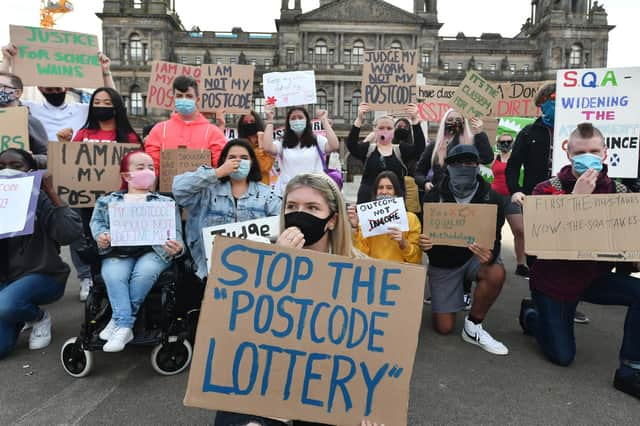SQA chief fails to apologise for exams fiasco


Fiona Robertson, who heads the Scottish Qualifications Authority, was quizzed by MSPs about the process which saw more than 124,000 grades marked down from teacher estimates, as the body grappled with a new system in the light of the cancellation of exams as a result of the Covid pandemic.
However, despite her organisation’s results being thrown out by Deputy First Minister John Swinney yesterday, in what was described as a “humiliating climbdown” for the Scottish Government, Ms Robertson said that the SQA had achieved what it was tasked to do by the government – to maintain standards.
Advertisement
Hide AdAdvertisement
Hide AdAs politicians lined up to ask her about massive downgrading of pupils in individual schools, she admitted that there had been “anomalies” but stressed that the appeals system was expected to deal with those, and refuted suggestions that school postcodes played a part in how results were adjusted.
Asked directy by Scottish Conservative Jamie Greene if she should say sorry, as the First Minister and Education Secretary have done, she said: “Of course it was difficult to see the reaction to last week's results. But we were asked to fulfil a role and part of that was to maintain standards across Scotland. While I fully understand the strength of the feelings of young people it is important that I explain the basis of what we did... it was a commission from ministers in extraordinary circumstances and I think we did our best to deliver.
“I fully appreciate young people felt their achievements had been taken outwith their control and I regret how young people have felt about this process. However I’ve had many messages from young people saying how pleased they are with the outcome. It's important to temper the strong feelings of young people who feel they've been unfairly treated with the delight from others who feel they have been rewarded for their achievements.”
Again, asked if she thought it was fair that the SQA used a system “which ignored individual pupils performance and moderated grades based on a school’s previous performance”, she said she couldn’t “accept that characterisation” and also refused to answer directly whether Mr Swinney’s decision had now undermined Scotland's examination system.
Ms Robertson said teacher estimates had been treated with the "utmost respect" and as a result 75 per cent were accepted. However she said the SQA had evidence that past accuracy of teacher estimates was below 50 per cent, and therefore there was a "clear and unequivocal case" for moderation.
However she said she "understood" why the Education Secretary - who is now facing a vote of no confidence tomorrow – had now rejected the SQA’s process despite government ministers vigorously defending it for the last week, and that she would "fully comply" with the government's decision to re-award grades based on teacher estimates.
The SQA would also play a full part in the reviews Mr Swinney also announced, she said.
Admitting it had been “very difficult to see the reaction to last week's results” she added: "The moderation was based on data – it was the only evidence we had. The extraordinary circumstances of the year meant we were awarding on a basis that was not ideal because the cancellation of exams was unprecedented. We tried to create a process which was not based on historic performance entirely, we allowed flexibility, but without that data we wouldn’t have been able to do any moderation at all, and the outcome showed a narrowing of the attainment gap.”
Advertisement
Hide AdAdvertisement
Hide AdScottish Labour's Iain Gray said the outcome had been “that young people in our most deprived communities were twice as likely to have their grades downgraded because of only taking historic performance of centres into account. Isn’t the problem here that the SQA did not trust the estimates made by teachers? That you were moderating teachers, not the pupils?”
Ms Robertson said: “No, we accepted 75 per cent of the teachers’ estimates but we had a responsibility to make sure that estimation across schools was consistent; that the results wouldn't be judged on the school a pupil went to but the data available to us, including historic data. It’s a subtle argument but an important one.”
When pressed by SNP MSP Alex Neil about the “human cost” of the fiasco – with one of his constituent’s daughter’s not eating for three days – she admitted "there has been a very significant human cost". She added: "But it is also important to say disappointment is part of results day. There were unique differences this year which magnified the sense of disappointment and I appreciate that.”
A message from the Editor:Thank you for reading this story on our website. While I have your attention, I also have an important request to make of you.With the coronavirus lockdown having a major impact on many of our advertisers - and consequently the revenue we receive - we are more reliant than ever on you taking out a digital subscription.Subscribe to scotsman.com and enjoy unlimited access to Scottish news and information online and on our app. With a digital subscription, you can read more than 5 articles, see fewer ads, enjoy faster load times, and get access to exclusive newsletters and content. Visit https://www.scotsman.com/subscriptions now to sign up.
Our journalism costs money and we rely on advertising, print and digital revenues to help to support them. By supporting us, we are able to support you in providing trusted, fact-checked content for this website.
Joy Yates
Editorial Director
Comments
Want to join the conversation? Please or to comment on this article.